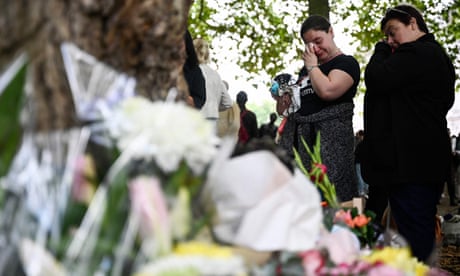The death of Queen Elizabeth II has plunged the royal household and much of the country into a period of mourning, with black armbands and flags at half-mast. While such traditions may seem far removed from everyday experiences of bereavement, experts say rituals can help us cope with death. “Mourning plays an important role in bereavement because it’s a way of externalising the emotions and thoughts of grief and, through that, incorporating the loss into your life and beginning to heal,” said Dr Lucy Selman, an associate professor in end-of-life care at the University of Bristol and the founding director of Good Grief Festival.
Dr Mary-Frances O’Connor, an associate professor of psychology at the University of Arizona and the author of The Grieving Brain, agrees that traditions are important. Mary-Frances O’Connor: ‘People struggle to understand grief, but it is a byproduct of love’ Read more “Mourning rituals can offer constancy and comfort in a moment when everything can feel very uncertain,” she said. “By connecting us to rituals that have existed for hundreds of years, we are reminded that those who came before us have experienced grief and uncertainty, and they have carried on and restored meaningful lives.
” Selman said markers of mourning such as armbands can help identify those who are grieving, and act as indicators to others to respect and offer comfort or support to the bereaved. That, she said, can be useful. According to a YouGov survey released in January, 30% of adults in the UK who had been bereaved found others not referencing their loss at all.
“If we had armbands or similar, perhaps grief would be less easy to ignore?” said Selman. O’Connor also said outward cultural signs of mourning can be beneficial, but she noted that the way we express grief changes vastly over time and across cultures. “What is important is an expression of grief that is meaningful to you, your family or your community,” she said.
“There are many cases where black armbands would be appropriate, but expressions of condolences on Twitter are completely modern, but no less meaningful. ” Dr Chao Fang, a research fellow at the Centre for Death and Society at the University of Bath, said the mourning traditions employed by the royal household offer a shared and personal platform to express grief, and enable a smooth transition from loss. That, he added, makes them a valuable way to encourage bonds and empathy among family, community and wider society in the face of death.
But with society becoming increasingly diverse, it is important to explore new customs and rituals, he said. “No matter if we draw upon past traditions or create new and personalised rituals, at the heart of our endeavours to mourn and grieve is to love, to remember and, ultimately, to find our own way to live with loss,” Fang said. Andy Langford, the clinical director of the charity Cruse Bereavement Support, said the pandemic’s disruption of funerals and other milestones for expressing grief had made bereavement much more painful for thousands of people.
Sign up to First Edition Free daily newsletter Archie Bland and Nimo Omer take you through the top stories and what they mean, free every weekday morning Privacy Notice: Newsletters may contain info about charities, online ads, and content funded by outside parties. For more information see our Privacy Policy . We use Google reCaptcha to protect our website and the Google Privacy Policy and Terms of Service apply.
Although these rituals have returned, Langford said more can be done. “A fixed mourning period for everyone experiencing a personal bereavement is unlikely to cover every eventuality, but it would go a long way to society being kinder to those grieving,” he said. “The expectation that grief has a short timeline and we should be over our bereavement in a few weeks is outdated.
This morning period we are seeing unfold for Her Majesty shows the need to take proper time to mourn. But ten days is just the start of the grief process. ” Langford said greater emotional support is needed for those who have been bereaved, including through funded specialist services, as well as better bereavement policies for employees, expanded statutory bereavement leave and a dramatic reduction in the administrative burden after someone dies.
O’Connor also stressed the need for employers to support bereaved staff. “In our 24/7 world, many people find it difficult – or are not able – to take time for grieving. However, as human beings, we still need a time and space to pause, to mourn, to adjust to what it means for us that someone has died,” she said.
.
From: theguardian
URL: https://www.theguardian.com/society/2022/sep/11/mourning-rituals-help-people-cope-with-grief-scientists
